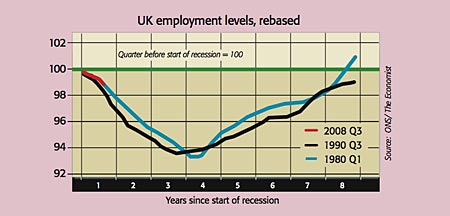Get the latest financial news, insights and expert analysis from our award-winning MoneyWeek team, to help you understand what really matters when it comes to your finances.
You are now subscribed
Your newsletter sign-up was successful
Want to add more newsletters?

Twice daily
MoneyWeek
Get the latest financial news, insights and expert analysis from our award-winning MoneyWeek team, to help you understand what really matters when it comes to your finances.

Four times a week
Look After My Bills
Sign up to our free money-saving newsletter, filled with the latest news and expert advice to help you find the best tips and deals for managing your bills. Start saving today!
Labour is virtually certain to lose a general election within the next 12 months, says Buttonwood on Economist.com. So how do stocks typically behave when there's a change of government? It seems it's a case of "buy the rumour, sell the fact".
According to ING's Gareth Williams, stocks tend to do better before the election than after it. In 1979, for instance, the market climbed before the Conservative victory, but lost 7% in the following four weeks.
So stocks will probably rally in anticipation of a Tory win, but the rebound will dissipate especially since this time round there will be "a hell of a mess to clear up".
MoneyWeek
Subscribe to MoneyWeek today and get your first six magazine issues absolutely FREE

Sign up to Money Morning
Don't miss the latest investment and personal finances news, market analysis, plus money-saving tips with our free twice-daily newsletter
Don't miss the latest investment and personal finances news, market analysis, plus money-saving tips with our free twice-daily newsletter
The big picture: a long slog for Britain's labour market
Employment is a lagging indicator, and it tends to lag for a very long time. It has fallen by 1% since it peaked at 29.5 million in the second quarter, says The Economist, and in the past two downturns troughed at 6% below the previous peak.

It will be at least as bad this time round. This recession is particularly nasty; the fall in output has already reached 4%, close to 1980-1981's 4.6%. What's more, recent research by the International Monetary Fund suggests that recessions caused by financial crises tend to lead to a particularly sharp increase in unemployment.
Get the latest financial news, insights and expert analysis from our award-winning MoneyWeek team, to help you understand what really matters when it comes to your finances.
MoneyWeek is written by a team of experienced and award-winning journalists, plus expert columnists. As well as daily digital news and features, MoneyWeek also publishes a weekly magazine, covering investing and personal finance. From share tips, pensions, gold to practical investment tips - we provide a round-up to help you make money and keep it.
-
 Should you buy an active ETF?
Should you buy an active ETF?ETFs are often mischaracterised as passive products, but they can be a convenient way to add active management to your portfolio
-
 Power up your pension before 5 April – easy ways to save before the tax year end
Power up your pension before 5 April – easy ways to save before the tax year endWith the end of the tax year looming, pension savers currently have a window to review and maximise what’s going into their retirement funds – we look at how

